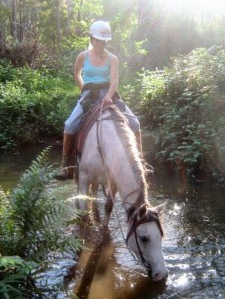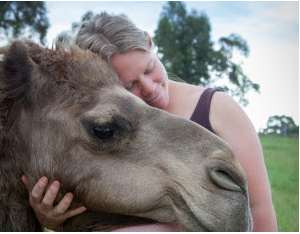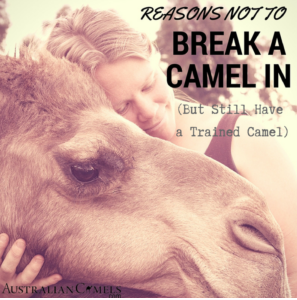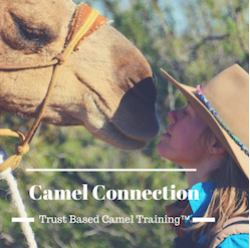5 Reasons Not to Break a Camel In - But Still Have a Trained Camel
Sep 08, 2021I grew up with horses and the terminology of “breaking” a horse in. When I became a professional horse trainer (years ago) I loathed the word “breaking in,” to me it just felt wrong and went against my method of training a horse and my natural instincts towards them. I used to dream of being part of the land with wild horses all around me, they were wild by nature, but they respected me as I respected. I draw inspiration from the Book Shy Boy (<< recommend reading) by Monty Roberts - a horse trainer I highly respect given his violent upbringing and in turn, gentle horse training & handling methods. Although my Shy Boy dream never turned into reality the core values of the training process was always with me and had a profound effect on how I trained horses and now camels too!
(side note: just to be clear we do not use Monty Roberts nor any other famous horse trainer methods with camels, we've developed this method to work with, train & handle camels).
All camels are wild by nature – meaning their natural instincts will always be alive in them, unless of course, they are “broke”.
When a camel is broke (equal to: not taking in consideration the camel's instincts, behaviours and personality), a part of the camel dies. Their spark goes away. I liken it to a friend you know and love who you haven't seen in a while, then you catch up one day and they seem to be 'missing' when you look into their eyes. The end results may be a camel that can be handled and or ridden, but the camel is not interested in you, they only fear you. There is no relationship, no real trust, just fear of what might happen if a ‘wrong turn’ or, god forbid, a mistake is made. They are responding to fear, not connection or understanding, but the short-term results are the same wether it be gentle or dominating camel training... A trained camel.
There is nothing like building a trusting relationship with a camel. It never surprises me when I see some video footage of a ‘wild animal’ like a Lion [link] or a crocodile [link] bond with and trust a human without them being eaten alive - it seems insane, but raises new questions to how we can connect with animals, in our case camels.
Society has lead us to believe that we have to be dominate over animals in order to make them do what we want them to do - kinda like the human-race really! When you really think about this last statement isn’t it true within the human race? DOMINANCE is everywhere. Lack of relationships. Power and Ego inject our society... UNLESS of course you’re looking elsewhere, which is what we encourage our camel training clients to do. We don’t proclaim that our Camel Connection Trust Based Camel Training® is the only camel training that works – because it’s not! But for the right people, it is the only way because they crave that relationship with the camel. They want connection over dominance and they want to the camel to work WITH them not have the camel work FOR them.
Side note: When I say ‘relationship’ I don’t mean feeding your camel treats to connect with them, I mean deep, heart to heart, true bonding experience. Once you’ve experienced such a thing you’ll see camels from a difference perspective - forever!
The truth is that us human's need the training! We need to understand camels better, not try make the camel understand us (although that happens organically in the process). We need to make that connection so both camel and handler (human) can work together rather than against each other via dis-trust and lack of understanding.
Mutual respect and trust is a must for great long term camel handling and training . Often people mistaken a trust based training approach as 'spoiling' or allowing the camel to run all over you with out any boundaries. Nothing can be further from the truth. Trust Based Camel Training always includes clear boundaries for both the camel and the human - camels can be dangerous, theres no doubt about that! Camel Training is a process of breaking down the barriers between the camel and handler. The barriers of ego (we all have it!). The barriers of doubt. The barriers of fear. The barrier of lack of understanding. The camel handler and camel are learning to understand each other. They're learning what is acceptable and what is not acceptable (both ways). This can be done all through gentle methods without 'shocking' the camel into obedience by using dominance.
5 Reasons Not to Break a Camel In, But Still Have a Trained Camel:
1. In the long term, camels do not respond well to dominate training & handling methods. We've seen this time and time again with older camels that have been trained and handled through dominance. They are always on the verge of pure fear, don't like people, often lash out and can become dangerous, but in saying that, we have worked with these types of camels that have finally come around through gentle handling and re-training, but we can testify - a camel NEVER forgets (like an Elephant)!
2. Camel Training with Coercion (using force or threats) does not equal to building a solid, trusting relationship with a camel. The camel will always do as it's told out of fear, not out of it's willingness of wanting to work with you.
3. Camel Resistance. The camel will try to protect itself (by lashing out and biting/kicking etc) and resist the training more if there is dominance and ego involved. Camels do not respond well to ego, in fact, we've seen camels become more unsettled which makes the process of training a lot harder - if not impossible
4. Dangers for future handling & training. ‘One day’ the camel might drop it’s fear of humans and allow it’s instincts to take over again. The camel will always win. Be cautious about handling and raising baby camels, read this post about raising baby camels - too much handling could be life treating.
5. Breaking In kills the camels spirit. The camels full potential might never be revealed if there is dominance and coercive training & handling. Camel's by nature are gentle, loving creatures AND they are not vindictive by nature. They are built to build strong bonds and to work as a team - like the do in their wild herds. Take their strengths and use it to your training & handling advantage. Work WITH the camel, don't have the camel work FOR you.
It's our passion to help show other passionate camel people and owners how to achieve a long lasting relationship with their camel(s). We’re not interested in ‘breaking in’ camels nor are we that interested in training camels just to sell them on as a ‘trained camel,’ but what we are interested in is teaching people how to connect with a camel and develop a trusting relationship - we KNOW it works and SEE it work everyday! We’re so passionate about this that we have declined to work with people who just want us to train their camels. That’s not what it’s about! Camels are such sensitive creatures that need to be understood, and especially, they need to understand their handler(s).
This style of training is not for everyone, but it is for every camel. Those that understand It’s importance have a beautiful connection and trusting relationship with their camels that no words can describe. If this sounds like you and you want to learn more about this camel training experience see more HERE.
If you like the idea of training a camel through connection, respect and kindness CHECK OUT OUR IN-PERSON TRUST BASED CAMEL TRAINING CLINICS RAN REGULARLY
OR
If you're anything like me and like to learn as much as you can in a short amount of time... Invest in our Trust Based Camel Handling ONLINE Course (which includes a Free Camel Husbandry eBook!)
In 1 hour you will learn the core content of the Camel Connection Trust Based Camel Training® method. Get it HERE (with instant access too!)
Get Your Free Copy:
Introduction to Camels eBook
We hate SPAM. We will never sell your information, for any reason.








